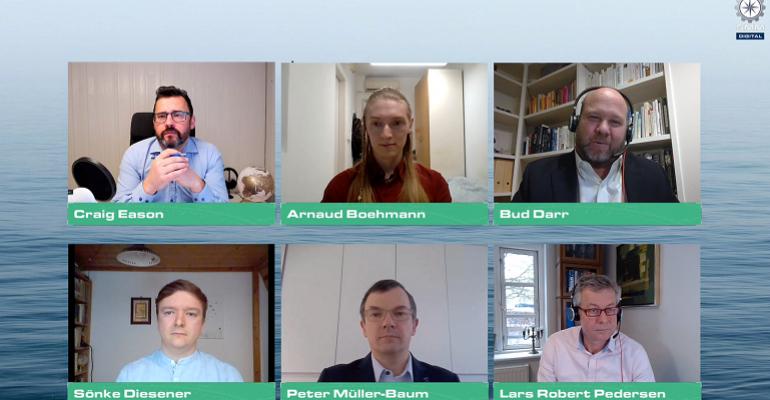One clear flashpoint was the IMO’s initial GHG strategy and its goals of reducing GHG emissions per transport work by at least 40% by 2030 compared to 2008, and the 2050 target of reducing total annual emissions from shipping by at least 50% compared to 2008 levels.
Insufficient target
‘Already the measures in place to meet the 2030 goal are not enough,’ said Sönke Diesener, Transport Policy Officer, Nature and Biodiversity Conservation Union (NABU).
‘There is already a lack of ambition if you look at these measures which will not bring a move as fast as possible to a peak in emissions from shipping. You already have a set of regulatory measures that will not meet your own goals,’ he contested.
Adding to shipping’s failure in the NGOs’ views was their belief that the IMO goals themselves fell short of setting targets in-line with the United Nations Framework Convention on Climate Change (UNFCCC) Paris Agreement.
‘To say that the targets are insufficient is very subjective,’ said Bud Darr, Executive Vice President, Policy & Government Affairs, MSC Group. ‘If the targets were insufficient then I think governments should have said that at the time at IMO. I will point out that we’re working under an initial strategy with initial levels of ambition that is in the pipeline to be reviewed. If they are insufficient, they can be changed.’
Availability of technical solutions
Where there was agreement on the panel was that shipping needs to completely decarbonise, and that the technology to enable this does exist, but there is work to be done to bring them to market.
‘We have the technical solutions ready,’ said Peter Müller-Baum, Managing Director, VDMA Engines and Systems.
“You can’t buy it today, but this is just a market issue and a political regulation issue. Technical solutions in theory and in principle are developed. That doesn’t mean that we have all of the bits and pieces yet, there is of course a lot of research and development necessary to be able to have the technical solutions we may use in 2050.
‘If you buy an engine today for example, you could buy an engine you can use today with LNG but in 10 or 20 years with a minor retrofit you could use with ammonia. You can buy today a diesel engine you may use with e-fuels in 10 or 20 years,’ said Müller-Baum.
Fuels availability
A counterpoint to the availability of technology is the availability of the necessary fuels, said Darr. He expected engine manufacturers to have solutions ready in time for using methanol as a drop-in fuel or using ammonia in dual fuel LNG engines, ‘what’s missing is the developments on the fuel side from energy producers at scale,’ he said.
After agreeing with the need to attack the fuel availability issue, Arnaud Boehmann, Spokesperson, Fridays for Future Germany, laid out where he sees shipping industry and environmental NGOs differ most: urgency.
‘We do genuinely appreciate that people are now today doing something they did not do 10 years ago, which is say “Yes we know that we need to decarbonise, we want to do it and we will do it.” However, we do not share the same sense of urgency,’ said Boehmann.
That need for ambition and urgency sat in tension with the need for profitable shipping, something the NGOs said was not their concern. ‘It is our job, and we are very well suited to it, to be a pain in the ass. Whether that’s the shipping industry’s ass or someone else’s,’ said Boehmann.
A longer version of this article can be found on our sister site Seatrade Maritime News.
Copyright © 2024. All rights reserved. Seatrade, a trading name of Informa Markets (UK) Limited.
Add Seatrade Cruise News to your Google News feed.  |

